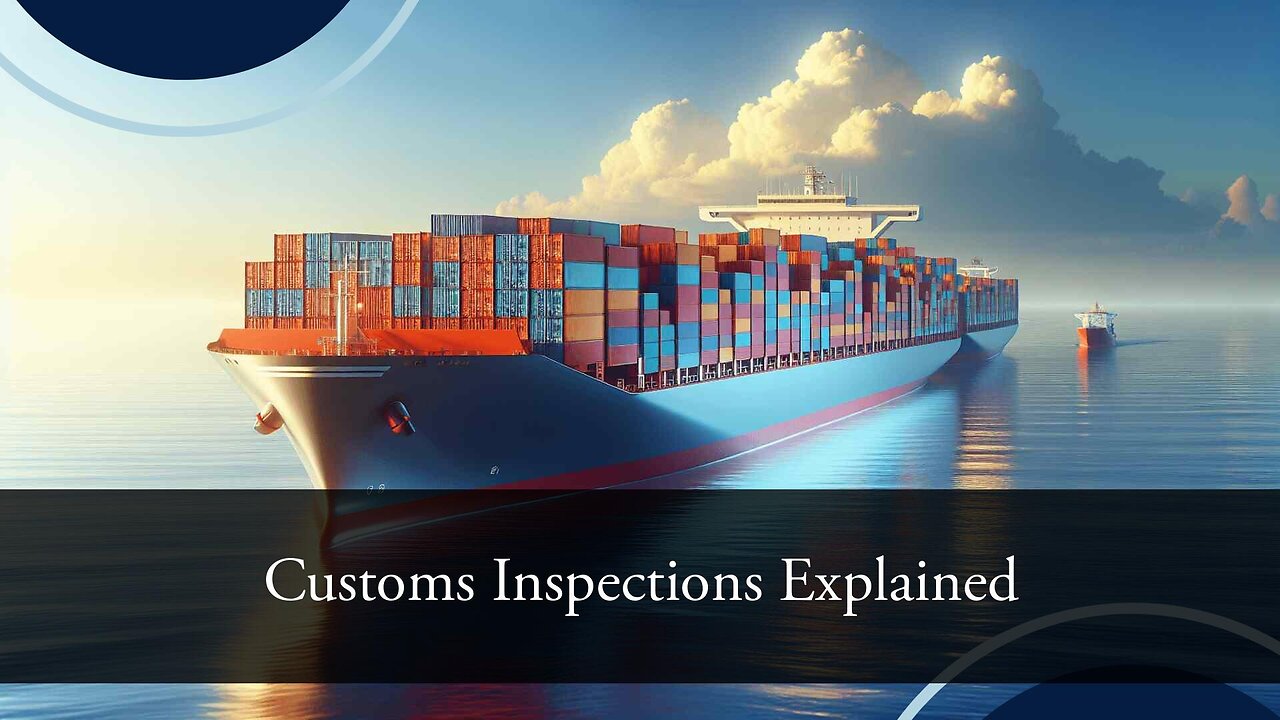Premium Only Content

Cracking the Customs Code: Mastering the Art of Customs Inspections
ISF Template | 562-453-7357 | isf@isftemplate.com | www.isftemplate.com
ISF Template | 800-2
In this video, we discuss the importance and reasons behind customs inspections in international trade. Customs inspections are routine examinations conducted by customs authorities to verify the accuracy and compliance of imported goods. These inspections play a crucial role in preventing smuggling, ensuring trade compliance, protecting public health and safety, and collecting appropriate duties and taxes. Customs inspections aim to verify the accuracy of import documents, ensure compliance with customs regulations, maintain security measures, and protect public health and safety. There are different types of inspections, including physical inspections, document inspections, and risk-based inspections. Failing to comply with customs regulations can have significant consequences for importers, such as penalties, delays, seizure of goods, or legal action. It is essential for importers to work closely with customs brokers to ensure compliance and avoid potential pitfalls.
Customs brokerage is an essential aspect of international trade, as it involves managing the customs clearance process when importing or exporting goods across international borders. Customs brokers play a crucial role in facilitating trade by acting as intermediaries between importers or exporters and customs authorities. They possess the expertise and knowledge to navigate complex customs procedures and ensure compliance with relevant laws and regulations.
One important element of customs clearance is the customs bond. A customs bond acts as a financial guarantee, ensuring the payment of import duties, taxes, penalties, and other fees required by customs. It provides assurance to customs authorities that they will receive payment even if the importer fails to fulfill their obligations.
The Importer Security Filing (ISF) is another crucial aspect of customs clearance, particularly for shipments entering the United States by vessel. The ISF is a requirement by the US Customs and Border Protection and includes detailed information about the shipment, such as shipper and consignee details, itemized goods information, and container loading details. Submitting an accurate and timely ISF is essential to avoid penalties and delays in the customs clearance process.
International trade agreements also have a significant impact on customs clearance. These agreements are negotiated between countries to facilitate trade by reducing or eliminating tariffs, quotas, and other trade barriers. Understanding and leveraging the benefits of these trade agreements can help reduce import duties and streamline the customs clearance process for goods.
In the digital age, technology has transformed the customs clearance process. Various digital platforms and software solutions are available that enable importers and exporters to manage customs procedures more efficiently. These platforms offer features such as document management, automated customs filings, real-time tracking, and compliance checks. By utilizing these tools, organizations can save time, reduce errors, and ensure smoother customs clearance for their shipments.
Partnering with a reliable customs agent or customs brokerage firm is crucial for effective customs clearance management. These professionals have the expertise and resources to handle all necessary paperwork, documentation, and communication with customs authorities on behalf of their clients. Working with them ensures streamlined customs processes and compliance with all legal requirements.
In conclusion, managing the customs clearance process involves working with a customs broker, obtaining a customs bond, filing the necessary Importer Security Filing, leveraging international trade agreements, utilizing digital platforms, and partnering with a reliable customs agent. By following these steps and ensuring compliance with customs regulations, businesses can navigate the customs clearance process smoothly and efficiently.
#usimportbond #isfcustomsbroker #uscustomsclearing #isfentry
Video Disclaimer Here: This video is designed for education and is unaffiliated with US government bodies.
00:55 Customs inspections are crucial for ensuring trade compliance and security by verifying the accuracy and authenticity of import documents, ensuring compliance with customs laws, and safeguarding national security.
02:15 Different types of customs inspections include physical examinations of goods, document verifications, and risk-based inspections prioritizing higher-risk shipments for more effective scrutiny.
05:47 Non-compliance with customs regulations can lead to penalties, shipment delays, seizure of goods, or legal action, emphasizing the importance of working closely with customs brokers to ensure compliance and avoid potential pitfalls.
-
 5:58:38
5:58:38
Fresh and Fit
10 hours agoResponding To Druski Skit, Tate Case Win, Fuentes Assassination Attempt & MORE
184K38 -
 4:13:32
4:13:32
Nerdrotic
14 hours ago $60.71 earnedSUPERMAN Drops, Disney Cuts WOKENESS? Hollywood DEI is DEAD | Friday Night Tights 333 Little Platoon
167K53 -
 1:23:14
1:23:14
Talk Nerdy 2 Us
10 hours agoSpecial Guest - Next UFC Superstar - Dani Aleksovska
70.7K -
 1:02:40
1:02:40
Man in America
12 hours agoThe Elites Are Losing Their War on Our Children w/ Robert Bortins
35.6K11 -
 3:30:43
3:30:43
I_Came_With_Fire_Podcast
15 hours agoGovt' Shutdowns, VA Scandals, MORE Drones, Syrian Strikes and staged rescues , and The DHS!
105K22 -
 56:55
56:55
The StoneZONE with Roger Stone
10 hours agoTrump Should Sue Billionaire Governor JB Pritzker for Calling Him a Rapist | The StoneZONE
81.8K11 -
 59:21
59:21
Adam Does Movies
10 hours ago $2.44 earnedMore Reboots + A Good Netflix Movie + Disney Live-Action Rant - LIVE
52.2K1 -
 36:28
36:28
TheTapeLibrary
19 hours ago $11.82 earnedThe Disturbing True Horror of the Hexham Heads
77K7 -
 6:08:00
6:08:00
JdaDelete
1 day ago $7.17 earnedHalo MCC with the Rumble Spartans 💥
55.6K7 -
 3:52:22
3:52:22
Edge of Wonder
13 hours agoChristmas Mandela Effects, UFO Drone Updates & Holiday Government Shake-Ups
47.8K15